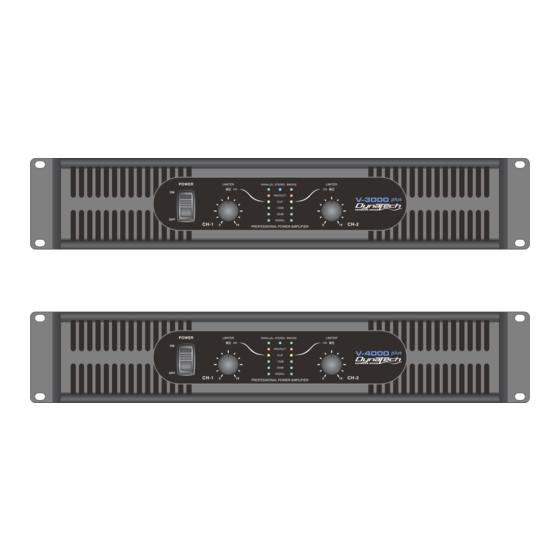Dynatech V PLUS Series Інструкція користувача - Сторінка 12
Переглянути онлайн або завантажити pdf Інструкція користувача для Підсилювач Dynatech V PLUS Series. Dynatech V PLUS Series 14 сторінок.

V-3000 PLUS / V-4000 PLUS
P R O F E S S I O N A L
P O W E R
A M P L I F I E R
Protection
Front Views & Rear Views | Introduction | Front Panel | Rear Panel | SET UP | Operation Mode |
| Specifications
Protection
Limiter
The V PLUS Series comes with a built-in limiter. When the input signal overloads, the "CLIP LED's" indicate a signal
overload, at this time, the volume should be lowered to reduce distortion. If the input gain level is not reduced the built-in
limiter will activate. During signal overload, the limiter will reduce the input audio signal enough to minimize the amount
of clipping. A limiter takes the gain of an overloading signal and reduces it, the reduction in gain reduces distortion that
can cause damage to your speakers and amplifier. During normal operation below clipping, and momentary clips on
peaks, the limiter does not affect the audio signal and is inaudible. It will allow brief clipping of peaks and will only
activate when continuous, hard clipping occurs. During excessive clipping the limiter will reduce the audio signal enough
to minimize the amount of clipping. When the input signal decreases enough that clipping ends, the limiter will deactivate
and cease its gain reduction. The limiter has a fixed threshold and can not be adjusted.
Safe Power Levels at Different Output Loads
8-Ohm Loads: The amplifier can operate at its rated power level without risk of overheating. However, it may caused
excessive temperature if it is pushed hard enough to continually light the" CLIP" indicator, the amplifier's average output
power can reach its maximum peak.
4-Ohm Loads: If the "CLIP" indicator flashes occasionally, the amplifier is approaching its maximum long-term power
capacity. If it is lit about half the time, the amplifier channel will probably go into thermal protection within a few minutes.
2-Ohm Loads: Except for an occasional flash, keep the "CLIP" indicator dark to avoid overheating the amplifier channel.
Clipping should be kept to a reasonable minimum. An amplifier's peak current draw at full output power into 2 ohms is
several times what the "normal" draw is, but its various protection circuits will prevent this condition lasting more than a
minute or two.
Short Circuit Protection
The V PLUS Series amplifiers all come with built-in Output Short Circuit Protects IGM (Instantaneous Gain Modulation).
The IGM and thermal circuits will protect the amplifier automatically if one side of your amplifier becomes shorted, and
goes into "CLIP" mode. The IGM circuit senses the short circuit while under an extremely stressful load condition and
attenuates the signal, this is to protect the channel's output transistors from over-current stress. If the short circuit
remains the same, the load will be disconnected by the thermal protection circuitry (i.e. output relay opens).
Thermal Protection
Dual 2-speed fans on the V PLUS Series amplifier provide adequate cooling. During low level output, the fans run at
normal speeds. During high output and as heat raises, (exceeding 50° C), the fans will run at higher speeds to aid the
cooling process. If the heatsink temperature exceeds 91° C, the amplifier will mute until the amplifier cools down. When
the amplifier cools below 90° C, the amplifier will return to normal operations. Be sure not to operate your amplifier
below the minimum load ratings to reduce the risk of overheating problems.
Input/Output Protection
The input circuits are isolated by resistors. An ultrasonic network uncouples RF from the output and helps to keep the
amplifier stable with reactive loads.
Operating Voltage (AC Mains)
On the rear panel will indicate the correct AC mains voltage. Connecting to the wrong voltage is dangerous and may
damage the amplifier. Always be sure the source voltage for your areas matches the required voltage for your amplifier.
page 11
